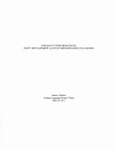| dc.rights.license | In Copyright | en_US |
| dc.creator | Muther, Hannah Elizabeth | |
| dc.date.accessioned | 2011-09-22T19:40:14Z | |
| dc.date.created | 2011 | |
| dc.identifier | WLURG38_Muther_GERM_2011 | |
| dc.identifier.uri | http://hdl.handle.net/11021/23160 | |
| dc.description | Thesis; [FULL-TEXT RESTRICTED TO WASHINGTON AND LEE UNIVERSITY LOGIN] | en_US |
| dc.description | Hannah Elizabeth Muther is a member of the Class of 2011 of Washington and Lee University. | en_US |
| dc.description.abstract | The increased fragmentation of the German party system is not a crisis, although the Volksparteien may see it as such, but rather a symptom of the parties' failure to represent and serve German voters. The FDP attempted to portray itself as a "ParteijUr das ganze VollC' in its unorthodox 2002 Bundestag campaign, but this strategy failed to take into account a fundamental reality: there no longer exists a singular German Volk. Reunification brought about an immediate diversification of the electorate; and the results of recent elections show the continued existence of a distinct eastern electorate that the western parties have failed to reach. The composition of German society as a whole is changing more rapidly and drastically than ever. 173 As German society becomes more fragmented, so too must the party system. But if Germany's political parties do not adapt to the changing sociopolitical environment, they risk becoming obsolete. The Volksparteien still view themselves as umbrella parties, but voters want to exercise their individualism rather than be forced to fit underneath two large umbrellas, so voters have turned to smaller parties to express their more specific political interests. The FDP wisely chose to rebrand itself as a serious party with the economic competence needed to balance out the Union. But this one strategic adaptation will not suffice; the FDP must consider a partnership outside of the center-right coalition in order to avoid a position where the party cannot adapt to future changes in the electorate. At this point, it is impossible to predict if overall dominance of Volksparteien will diminish, or even how the FDP will fare in the 2013 Bundestag election, despite the aid ofa close examination of the factors that led to the FDP's past successes and failures. The only thing clear about the future of the German party system is that Germany is changing, and it will not slow down for the parties that fail to accept this reality. [From the Conclusion] | en_US |
| dc.description.statementofresponsibility | Hannah Muther | |
| dc.format.extent | 61 pages | en_US |
| dc.language.iso | en_US | en_US |
| dc.rights | This material is made available for use in research, teaching, and private study, pursuant to U.S. Copyright law. The user assumes full responsibility for any use of the materials, including but not limited to, infringement of copyright and publication rights of reproduced materials. Any materials used should be fully credited with the source. | en_US |
| dc.rights.uri | http://rightsstatements.org/vocab/InC/1.0/ | en_US |
| dc.subject.other | Washington and Lee University -- Honors in German Language | en_US |
| dc.title | Germany's Free Democrats: Party Development and Post-Reunification Challenges (thesis) | en_US |
| dc.type | Text | en_US |
| dcterms.isPartOf | RG38 - Student Papers | |
| dc.rights.holder | Muther, Hannah Elizabeth | |
| dc.subject.fast | Politics and government | en_US |
| dc.subject.fast | Political parties | en_US |
| dc.subject.fast | Germany | en_US |
| local.department | German Language | en_US |
| local.scholarshiptype | Honors Thesis | en_US |
